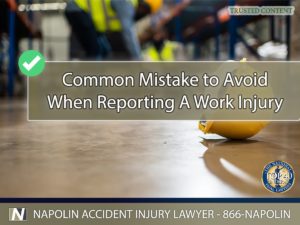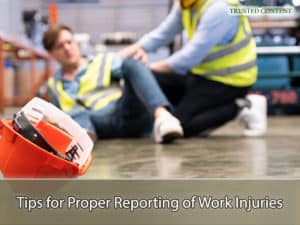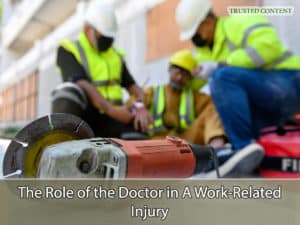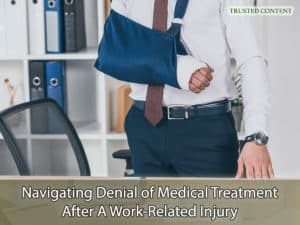Common Mistake to Avoid When Reporting A Work-Related Injury
Introduction to Common Mistake to Avoid When Reporting A Work-Related Injury
When you get hurt at work, it's essential to report the injury to your employer right away. This helps you get the medical care and support you need. Unfortunately, many people make a common mistake when reporting their work-related injuries. They don't list every body part they think is affected by the injury on the claim form. This mistake can lead to problems, like not getting the right treatment for your injury. In this article, we'll explain this common mistake and how to avoid it. We'll also discuss the role of doctors and what to do if your treatment is denied. By learning about this mistake, you can make sure you get the proper care and support for your work-related injuries.

Common Mistake to Avoid When Reporting A Work-Related Injury
Understanding the Common Mistake
First, let's talk about the common mistake people make when reporting their work injuries. This mistake happens when someone doesn't include every body part they believe is related to their work injury on the claim form. For example, if you hurt your back and your leg at work but only mention your back on the form, this is the mistake we're talking about.
Not listing all the affected body parts can cause problems. When the insurance adjuster reviews your claim, they only authorize treatment for the body parts you mentioned. So, if you missed any, the doctor won't treat them, and they won't appear on the medical report sent back to the adjuster. Later, if you want treatment for the body parts you didn't list, the adjuster might deny it. That's why it's so important to be over-inclusive and mention all the body parts you think are related to your work injury.

Tips for Proper Reporting of Work Injuries
Tips for Proper Reporting of Work Injuries
To avoid the common mistake and make sure you get the right treatment, follow these tips for proper reporting:
- Be over-inclusive: When you fill out the claim form, list every body part you think is related to your work injury, even if you're not completely sure. It's better to include too much information than to leave something out.
- Document your symptoms: Write down all your symptoms and how they affect your body. This can help you remember everything when filling out the claim form.
- Take pictures: If you have visible injuries like cuts, bruises, or swelling, take photos of them. This can serve as evidence to support your claim.
- Keep a record: Save all your medical documents, like doctor's notes and prescriptions, in one place. This can help you stay organized and make it easier to provide information to your employer or insurance adjuster if needed.
By following these tips, you can ensure that your work-related injury is reported accurately and completely. This will increase your chances of getting the right treatment and support for your recovery.

The Role of the Doctor in A Work-Related Injury
The Role of the Doctor in A Work-Related Injury
Now that you know how to report your work injury correctly, let's talk about the role of the doctor in this process.
- Evaluation and treatment: When you visit the doctor for your work injury, they will examine all the body parts you listed on your claim form. They'll figure out if those body parts are really involved in the work injury and provide the right treatment.
- Medical report: After the doctor examines you, they'll write a medical report about your injury. This report includes information about the body parts affected, the treatments they recommend, and how long it might take you to recover. The insurance adjuster uses this report to decide which treatments to approve for your injury.
By being over-inclusive when reporting your work injury, you give the doctor a better chance to identify and treat all the affected body parts. This helps you get the care you need for a faster and smoother recovery.

Navigating Denial of Medical Treatment After A Work-Related Injury
Navigating Denial of Medical Treatment After A Work-Related Injury
Sometimes, even if you report your work injury accurately, the insurance adjuster might deny treatment for some body parts. Don't worry! Here's what you can do in such situations:
- Speak with your doctor: If the insurance adjuster denies treatment for a body part, talk to your doctor. They can provide more information or clarification about why the treatment is necessary. Your doctor might even write a letter to the adjuster explaining the situation.
- Stay proactive: Keep track of your symptoms and any new developments in your condition. If a denied body part starts causing more problems, let your doctor know right away. They can update your medical report to include this new information, which might help convince the adjuster to approve the treatment.
- Seek legal advice: If your treatment is still denied after trying these steps, consider talking to a lawyer who specializes in work-related injuries. They can help you understand your rights and guide you through the process of appealing the denial.
By staying proactive and taking the right steps, you can improve your chances of getting the treatment you need for a full recovery from your work-related injury.
Conclusion to Common Mistake to Avoid When Reporting A Work-Related Injury
In this article, we've learned about the common mistake people make when reporting work-related injuries: not listing every body part they believe is related to the injury on the claim form. To avoid this mistake, remember to be over-inclusive when reporting your injury and follow our tips for proper reporting.
We also discussed the role of the doctor in evaluating and treating your injury, as well as how to navigate treatment denials. By staying informed and proactive, you can ensure that you receive the appropriate care and support for your work injury.
Now that you know about this common mistake, you can be better prepared to report any work-related injuries you may experience in the future. Accurate and complete reporting is essential to getting the help you need for a speedy and successful recovery.
- Safely and Legally Navigating Parking Lots in California - July 15, 2024
- Navigating the Aftermath of a Highway Auto Accident in California - July 15, 2024
- An Overview of California's Commercial Truck Insurance Laws - July 15, 2024
